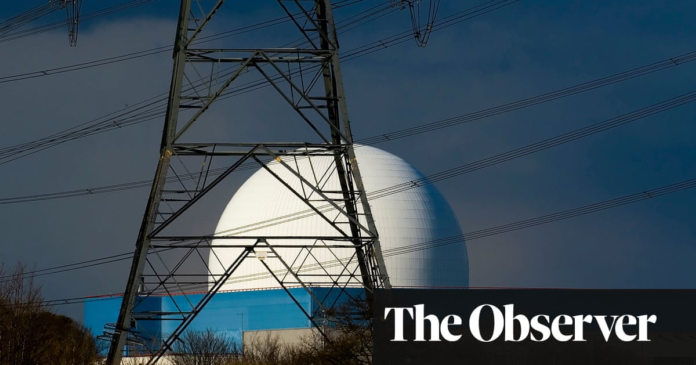Please bookmark for future updates
Green energy entrepreneur voices concerns over project’s funding and ‘spiralling costs’ of UK’s other nuclear plants
The government’s new value for money tsar has been challenged to examine the costs of a nuclear power station to be given final approval next year, as ministers attempt to shore up private investment for the project.
New nuclear plants are a key part of the government’s plan to have clean power by 2030. The Sizewell C reactor, billed as generating enough energy to power 6m homes, is expected to be given the final go ahead in June’s review of public spending. Its projected costs are in excess of £20bn.
However, Labour donor and green energy entrepreneur Dale Vince has written to the chair of the governments’ new Office for Value for Money (OVfM), David Goldstone, arguing that a nuclear plant already being built has seen spiralling costs. He also warns the construction of Sizewell C “will saddle consumers with higher bills long before it delivers a single unit of electricity”.
The government and the French state-owned company EDF will fund about 40% of the Sizewell C project, with ministers currently rounding up private investors to meet the rest of the costs. In his letter, Vince claims that billions have already been spent on the project, even “before a final investment decision has been made”. He also raises concerns about the ballooning costs and delays of Sizewell C’s sister project, Hinkley Point C, in Somerset.
“If Hinkley Point C is anything to go by, Sizewell C really should have rigorous financial scrutiny,” he writes. “Originally priced at £18bn, the cost of Hinkley has ballooned to £46bn and then there’s the delays. Back in 2007, the then EDF chief executive Vincent de Rivaz said that by Christmas 2017 we would be using electricity generated from atomic power at Hinkley. We’re now in Christmas 2024 and Hinkley isn’t due to be completed until 2031.
“Due to a novel funding method, a lengthy construction timeline for Sizewell will saddle consumers with higher bills long before it delivers a single unit of electricity at a time when there is clear evidence that we can secure a cleaner, cheaper energy future without nuclear.”
It comes after a similar warning by Citizens Advice earlier this year. The charity warned that the Suffolk project may offer “poor value for money” and called for greater clarity on its funding, in a letter to the Department for Energy Security and Net Zero. It has warned that the project’s funding model could expose households to cost overruns.
Vince, whose Ecotricity business owns a series of renewable energy projects, also raised concerns about the money being invested in carbon capture technology. The government recently committed almost £22bn over 25 years to fund carbon capture and storage projects. However, some campaigners question the technology and argue the money could be better spent eliminating the production of carbon emissions in the first place.
“Carbon capture has not been proved to work at scale anywhere in the world today and the announced £1bn a year for almost a quarter of a century shows it’s not expected to be working any time soon,” Vince writes. “I’m just not convinced that it’s worth the money. The 4,000 jobs to be created in the first year will be costing £250,000 each – not exactly good value in my opinion.”
Sign up to Observed
Analysis and opinion on the week’s news and culture brought to you by the best Observer writers
after newsletter promotion
Vince calls on Goldstone, who oversaw the government’s £9.3bn investment for the 2012 Olympics, to examine the two projects should his remit allow him to do so. “I’d like to formally request you start a process and please let me know how we can take part,” he writes.
A government spokesperson said: “Nuclear and carbon capture are key to our ambitious target of delivering clean power by 2030. The £2.7bn settlement for Sizewell C provides the required funding for 2025-26, and work will begin this coming year on major carbon capture, usage and storage projects in the north-east to harness this gamechanging technology – helping to protect bill payers and secure thousands of good, skilled jobs across the country.”
Create an account
Welcome! Register for an account
A password will be e-mailed to you.
Password recovery
Recover your password
A password will be e-mailed to you.
Tuesday, December 31, 2024



